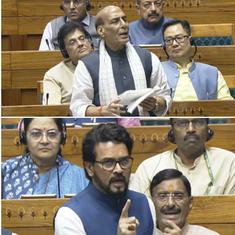South Korean director Bong Joon-Ho’s sixth feature, which has been released on Netflix on June 28, opens at a conference by the multinational Mirando Corporation, a global behemoth that promises to revolutionise the world of food, and particularly meat-eating with its genetically modified pigs. The corporation is headed by Lucy Mirando (Tilda Swinton), who is equal parts bonkers and ruthless capitalist. As the credits begin rolling, Mirando sets the stage for the experiment which forms the basis for the plot: 20 GMO pigs will be given to different farmers across the world and in 10 years, the best one will win a prize at a Super Pig competition in New York.
Okja proceeds to focus on the story of one those famers, Mija (Ahn Seo-hyun), and her grandfather, who raise Okja in a tiny village in South Korea. The young girl and her GMO companion are happy to spend time exploring the forest and foraging for food until Johnny Wilcox (Jake Gyllenhaal), a former TV personality and the current face of Mirando, show up to take Okja back to New York to meet her fate as an animal raised for slaughter.
Mija is determined to prevent that from happening and showcases almost superhuman skills in smashing glass doors with her body, running down trucks and taking on the South Korean police force to rescue Okja from her fate. Into the chaotic mix enters the Animal Liberation Front, headed by Jay (Paul Dano), who are resolutely devoted to rescuing animals from any kind of harm. The rest of the film follows Bong’s familiar mix of tonal shifts, moving from heist film to action thriller to eventually a long sequence at the end in a slaughter house which, while extremely affecting and heart-wrenching, looks exactly like an animal rights advertisement.
At the heart of Okja is a heartwarming tale about Mija and Okja. Their relationship showcases some of Bong’s best filmmaking skills, which include the ability to juggle wonder with absurdist humour and visual spectacle. But in all the elements surrounding the central narrative, he is never able to truly justify his outlandish idea.
Both Swinton and Gyllenhaal turn in campy performances that rarely work. The interior conflicts faced by their characters and the Animal Liberation Front, while being amusing, never become more than the sum of their parts.
Bong’s previous films too deconstructed genre conventions to form a social critique. In Memories of Murder (2003), the murder mystery became a tool to explore South Korean society. In The Host (2006), the giant monster was a metaphor for American influence in the country, while 2013’s Snowpiercer touched upon class conflict while exploring climate change. All three films, however, were first and foremost devoted to the idea of creating kinetic thrillers in which the ideology came second. In Okja, Bong retains his idiosyncratic vision, but the ideology overpowers the narrative, and the film becomes lesser for it.










